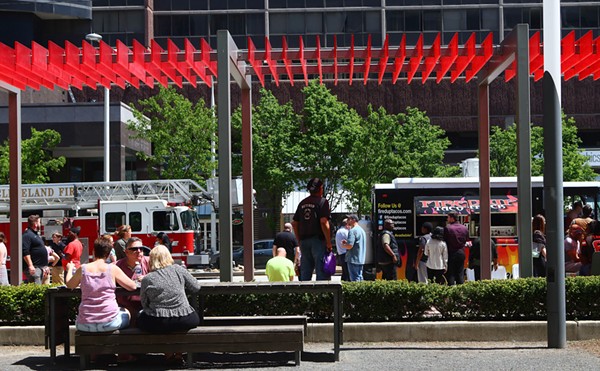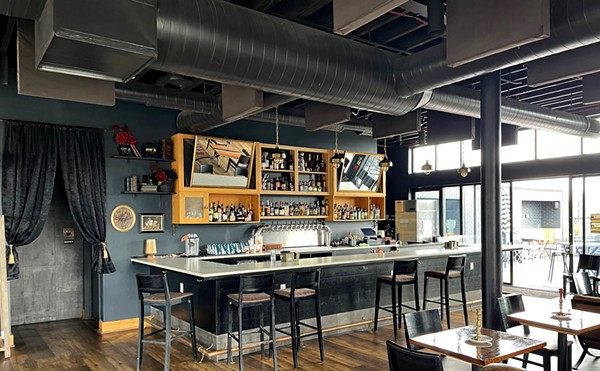Tucked into a dark and dusty corner of Dubick Fixture & Supply, a 65-year-old restaurant supply company in downtown Cleveland, sits a stockpile of used ranges, coolers, mixers and other commercial kitchen equipment waiting to be repaired, cleaned and shipped out to the next optimistic new restaurant owner.
"We call this area 'the land of broken dreams,'" says John Cipriani, whose family has owned Dubick since the mid-'80s. The equipment has boomeranged its way back to this 80,000-square-foot warehouse in Midtown after the closure of another failed restaurant and the crumbling of another man's life's dream.
If you're planning to open a restaurant in Northeast Ohio, chances are good you know Cipriani. He and his company are involved from the very start, designing kitchens and selecting equipment for the lion's share of Cleveland's top chefs. His fingerprints are on Lola, Greenhouse, Fahrenheit, Butcher and the Brewer, Ninja City... you name it. When Michael Symon needed help choosing a massive smoker for his new barbecue joint on East Fourth Street, he turned to Cipriani for help.
"With everything happening in Cleveland right now, it's a great time to be in the business," admits Cipriani.
Like most businesses, this one is built on relationships cultivated over time. Rocco Whalen has worked closely with Cipriani and Dubick on most of his projects, including the Charlotte, N.C.-based Fahrenheit. To see what equipment and layout would work for the new space, the pair staged the entire kitchen on a showroom floor 500 miles north of its permanent home.
"My goal as a chef and owner is to carve out as little space as possible for the kitchen in relation to the overall square footage of the restaurant," Whalen explains. "Chefs aren't architects — you think things will fit in the kitchen and they don't. So, for me, having the opportunity to map it all out was tremendously helpful."
If anybody knows the challenges and sheer brutality that awaits new restaurant owners, it's Cipriani. Growing up, his parents owned a restaurant in Seven Hills, where he saw firsthand the punishing 16- to 18-hour days, the fickle customers, the unrelenting winters. Throughout his sales career, he's seen more than his share of pie-eyed entrepreneurs sink their life's savings into a restaurant destined for disaster. He's also talked more than a few out of ever doing so in the first place.
"I see these young people who don't have any idea how hard it is to put a place together," he says. "It's like a well-orchestrated dance of architects, engineers, builders, electricians, inspectors, equipment suppliers, sign guys... By the end of it all you're beat up, you haven't slept in months, the money's been flowing out like water — and now the front door opens and you're expected to shine."
Cipriani says it takes between $80,000 and $220,000 to equip a typical professional kitchen, but that's just the start. There's the building improvements, dining room furniture, linens, tableware, glasses, food and drink, rent, utilities, insurance, signage, menus, attorney fees, advertising...
"People think you can lease restaurant equipment like you can lease a car, but the value of this stuff goes down so quickly that there's very little residual value left at the end of it," he says.
When you're investing upwards of a quarter of a million dollars on shiny new kitchen equipment, you want to make sure it's going to work for the restaurant. That's why Dubick built an entire test kitchen, where chefs and restaurant owners can kick the tires of various pieces of equipment before writing a check.
In the lead up to opening day, the team from Butcher and the Brewer used the test kitchen not only to experiment on their new equipment, but to develop the entire menu. The restaurant's $100,000 line includes a Josper oven, plancha grill and Woodstone oven, equipment that few in the back of the house had prior experience operating.
"We expected to be down there for two or three weeks, but ended up being there every day for two and half months," says executive chef Jim Blevins. "If we had to wait until we got all our permits, we would have been so behind. The faster we can open the doors, the faster we have money coming in."
The team went so far as to stage a mock restaurant, with the front-of-house management team sitting down at tables ordering, eating and commenting on the food.
With any luck, B&B's equipment will stay on East Fourth Street instead of finding its way back to Dubick's "land of broken dreams." While there's plenty of anecdotal evidence regarding the failure rate of new restaurants, Cipriani believes it's no different from selling widgets.
"New businesses in general fail at an alarming rate," he says. "It comes down to management and capital. It doesn't matter what you're selling; you go into business without enough capital to get through the first year, you're going out."
Dubick fixture & supply: 6201 Euclid Ave., 216-391-7189, dubickfixture.com.









